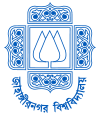
Dewan Niamul Karim, PhD Professor, Department of Management Studies
PROFILE
SHORT BIOGRAPHY
Dewan Niamul Karim is currently a Professor in the Department of Management Studies at Jahangirnagar University. He earned his PhD from Universiti Utara Malaysia (UUM) and his BBA and MBA from the University of Dhaka, Bangladesh. He has been actively involved in teaching at various private and public universities, including Jagannath University, Comilla University, BRAC University, and Stamford University, since 2005. He specializes in research areas such as high-performance HRM practices, knowledge management, employee attitudes and behaviors, motivation, and personality.
RESEARCH INTEREST
High-Performance HRM Practices; Organizational Justice; Organizational Culture; Designing Jobs; Personalities; Power and Politics; Employee Attitude, Motivation & Behavior; Knowledge Management.
Google Scholar Profile, Researchgate Account, Scopus Author ID, Web of Science ID, Sci Profile
JOURNAL PAPER
34. Dewan Niamul Karim & Md. Asaduzzaman, Linking talent management practices to autonomous work motivation and proactive customer service behavior: Insights from hospital nurses of Bangladesh, Social Sciences & Humanities Open, 13, pp.1 - 9, 2026.https://doi.org/10.1016/j.ssaho.2026.102444
Publisher: Elsevier. SCImago journal rank: Q1
33. Dewan Niamul Karim. Mirza Mohammad Didarul Alam, Rashed Al Karim & Abdul Halim Abdul Majid, Unveiling the dynamics of servicescape in stimulating proactive customer service performance: evidence from the healthcare sector in an emerging economy, International Journal of Quality & Reliability Management, 42, 10, pp.2714–2734, 2025.
https://doi.org/10.1108/IJQRM-12-2024-0436
Publisher: Emerald. Indexed in Scopus (Q2), ESCI (WoS), ABDC.
32. Dewan Niamul Karim & Md. Mosharref Hossain, Triggering extra-role customer service behaviour of bankers in a developing country: the role of perceived organisational support and workplace happiness, Management Matters, 22, 2, pp.125–141, 2025.
https://doi.org/10.1108/MANM-11-2024-0060
Publisher: Emerald
31. Tabassum Chowdhury, Rashed Al Karim, Md Karim Rabiul, Minhaz Ul Alam & Dewan Niamul Karim, Fostering Sustainable Environmental Performance Through Green Banking Practices: The Mediating Role of Employees’ Green Motivation and Green Behavior, 17, 8, pp.3750, 2025.
https://doi.org/10.3390/su17083750
Publisher: MDPI. Indexed in Scopus (Q1), SSCI & SCIE (WoS).
30. Rashed Al. Karim, Md Karim Rabiul, Sirazoom Munira, Dewan Niamul Karim & Sakia Kawser, Fostering employee retention intention through talent development practices, employee empowerment and organisational learning in the private banking sector, 32, 4, pp.641-659., 2025.
https://doi.org/10.1108/TLO-11-2024-0359
Publisher: Emerald. Indexed in Scopus (Q2), ESCI (WoS), ABDC.
29. Md. Siddikur Rahman, Hishamuddin Md. Som, Md H Asibur Rahman & Dewan Niamul Karim, A bibliometric analysis on intended and actual turnover in higher education, Higher Education Quarterly, 79, 1, pp.e12564, 2025.
https://doi.org/10.1111/hequ.12564
Publisher: Wiley. Indexed in Scopus (Q1), ESCI (WoS), ABDC
28. Dewan Niamul Karim & Muhammad Abdul Baset (2024), The role of high-performance work practices and affective commitment in promoting knowledge sharing behavior in higher education institutions., 16, 2, pp.23-42,
https://e-journal.uum.edu.my/index.php/gbmr/en/article/view/24970
Publisher: Universiti Utara Malaysia
27. Dewan Niamul Karim, Suman Paul Chowdhury, Abdul Halim Abdul Majid, Mohammad Rabiul Basher Rubel, Nadia Newaz Rimi, and Muhammad Ruhul Amin (2024), Linking HEXACO Personality Traits to Affective Commitment and Knowledge Sharing Behaviour in Higher Education Institutions, 23, 6, pp.1-24,
https://doi.org/10.1142/S0219649224500874
Publisher: World Scientific. Indexed in Scopus, ESCI (WoS), ABDC
26. Dewan Niamul Karim (2024), Perceived Fairness of Performance Appraisal: Does It Shape Bankers’ Attitudes towards their Job and Organization?, BUFT Journal of Business and Economics, 5, 1, pp.153-165,
https://doi.org/10.58481/BJBE/2410
Publisher: BUFT
25. Rashed Al Karim, Md Karim Rabiul, Towhid Ahamed, Dewan Niamul Karim & Mahmuda Mehzabeen, Integrating Green Entrepreneurial Orientation, Green Information Systems, and Management Support with Green Supply Chain Management to Foster Firms’ Environmental Performance, Sustainability, 16, 12, pp.4921, 2024.
https://doi.org/10.3390/su16124921
Publisher: MDPI. Indexed in Scopus (Q1), SSCI & SCIE (WoS)
24. Dewan Niamul Karim, Md. Mosharref Hossain, Suman Paul Chowdhury, Rashed Al Karim, Md. H Asibur Rahman, Md. Siddikur Rahman (2024), Linking performance appraisal fairness and performance feedback to bankers’ extra-role customer service behavior: A serial multiple mediation model, Social Sciences & Humanities Open, 10, pp.100956, Indexed in Scopus (Q1).
https://doi.org/10.1016/j.ssaho.2024.100956
Publisher: Elsevier
23. Md. Siddikur Rahman, Hishamuddin Md Som, Dewan Niamul Karim, Md. H Asibur Rahman & Mohammad Maksudul Karim (2023), The Effect of Pay Equity on Organizational Commitment in Higher Education Institutions in Bangladesh, Problems and Perspectives in Management, 21, 4, pp.240 –252, Indexed in Scopus (Q2).
http://dx.doi.org/10.21511/ppm.21(4).2023.19
Publisher: Business Perspectives
22. Dewan Niamul Karim (2023), Do job characteristics shape academics’ affective commitment and knowledge sharing behavior in the institutes of tertiary education?, Social Sciences & Humanities Open, 8, 1, pp.100663, Indexed in Scopus (Q1).
https://doi.org/10.1016/j.ssaho.2023.100663
Publisher: Elsevier
21. Mohammad Omar Faruq, Mohammad Osman Gani & Dewan Niamul Karim (2022), The Effect of Entrepreneurial Orientation on Firm Performance and Entrepreneurial Intention: Moderating Role of Prior-Training, Jahangirnagar University Journal of Management Research, 5, 1, pp.102–122, 20. Dewan Niamul Karim & Abdul Halim Abdul Majid (2022), Opportunity-enhancing HRM Practices and Knowledge Sharing Behaviour: The Mediating Role of Public Service Motivation, International Journal of Knowledge Management Studies, 13, 4, pp.359–383, Indexed in Scopus, ESCI (Web of Science), ABDC & ABS.
https://doi.org/10.1504/IJKMS.2022.126150
Publisher: Inderscience
19. Dewan Niamul Karim & Md. Siddikur Rahman (2022), Effect of Job Characteristics on Work Engagement: An Empirical Study in the Banking Sector of Bangladesh, Dhaka University Journal of Management, Special Issue, pp.69–80,
https://doi.org/10.57240/DUJMJUNE05
18. Dewan Niamul Karim, Linking dark triad traits, psychological entitlement, and knowledge hiding behavior (2022), 8, 7, pp.pp.e09450, Indexed in Scopus (Q1), SCIE (Web of Science), PubMed.,
Publisher: Elsevier
17. Md. H Asibur Rahman & Dewan Niamul Karim (2022), Organizational Justice and Organizational Citizenship Behavior: The Mediating Role of Work Engagement, Heliyon, 8, 5, pp.e09450, Indexed in Scopus (Q1), SCIE (Web of Science), PubMed.
https://doi.org/10.1016/j.heliyon.2022.e09450
Publisher: Elsevier
16. Shahnaz Sharmin, Md. H Asibur Rahman & Dewan Niamul Karim (2022), Green Human Resource Management Practices and Organizational Citizenship Behaviour towards the Environment in the Banking Sector in Bangladesh, Bangladesh Journal of Public Administration, 30, 1, pp.29–48,
https://doi.org/10.36609/bjpa.v30i1.111
15. Dewan Niamul Karim (2021), The Effect of Organizational Politics on Workplace Incivility in Higher Education Institutions in Bangladesh, The Jahangirnagar Journal of Business Studies, 10, 1, pp.17–26,
https://papers.ssrn.com/sol3/papers.cfm?abstract_id=4161961
14. Dewan Niamul Karim, Abdul Halim Abdul Majid, Khatijah Omar & Omar Jaber Aburumman (2021), The Mediating Effect of Interpersonal Distrust on the Relationship between Perceived Organizational Politics and Workplace Ostracism in Higher Education Institutions, Heliyon, 7, 6, pp.e07280, Indexed in Scopus (Q1), SCIE (Web of Science), PubMed.
https://doi.org/10.1016/j.heliyon.2021.e07280
Publisher: Elsevier
13. Dewan Niamul Karim (2021), Relationship between Perceived Organisational Politics and Workplace Ostracism at Higher Education Institutions, International Journal of Management in Education, 15, 4, pp.318–336, Indexed in Scopus, ERA, ACER (Australian Council for Educational Research).
https://doi.org/10.1504/IJMIE.2021.116529
Publisher: Inderscience
12. Dewan Niamul Karim (2020), Effect of Dark Personalities on Knowledge Hiding Behaviour at Higher Education Institutions, Journal of Information & Knowledge Management, 19, 4, pp.2050031, Indexed in ABDC, Scopus, ESCI (Web of Science).
https://doi.org/10.1142/S0219649220500318
Publisher: World Scientific
11. Dewan Niamul Karim & Muhammad Abdul Baset (2020), Effect of Organizational Justice on Work Engagement in the Banking Sector in Bangladesh, Jahangirnagar University Journal of Management Research, 3, 1, pp.15–17,
https://papers.ssrn.com/sol3/papers.cfm?abstract_id=4202174
10. Muhammad Abdul Baset & Dewan Niamul Karim (2020), Relationship between Perceived Organizational Support and Work Engagement: An Empirical Evidence from Bangladesh, The Jahangirnagar Journal of Business Studies, 9, 1, pp.15–19,
https://papers.ssrn.com/sol3/papers.cfm?abstract_id=4863884
9. Dewan Niamul Karim, Muhammad Abdul Baset, & Md Mizanur Rahman (2019), The Effect of Perceived Organizational Support on Intention to Stay: The Mediating Role of Job Involvement, The Jahangirnagar Journal of Business Studies, 8, 1, pp.21–30,
https://papers.ssrn.com/sol3/papers.cfm?abstract_id=4202480
8. Muhammad Abdul Baset, Dewan Niamul Karim, & Kanis Fatema (2019), The Mediating Effect of Corporate Code of Ethics on the Relationship between Organizational Culture and Business Ethics: An Empirical Study on Telecommunication Industry in Bangladesh, Jahangirnagar University Journal of Management Research, 2, 1, pp.15–19,
.
7. Dewan Niamul Karim & Abdul Halim Abdul Majid (2018), Autonomous Job Design and Knowledge Sharing Behavior: The Mediating Role of Public Service Motivation, International Journal of Economics, Commerce and Management, 11, 4, pp.607–622,https://papers.ssrn.com/sol3/papers.cfm?abstract_id=4197097
6. Dewan Niamul Karim & Abdul Halim Abdul Majid (2017), The Effect of High Performance HR Practices on Knowledge Sharing Behavior: The Mediating Role of Employee Engagement., International Postgraduate Business Journal, 9, 1, pp.74–88,
https://e-journal.uum.edu.my/index.php/gbmr/article/view/16762
Publisher: Universiti Utara Malaysia
5. Dewan Niamul Karim & Muhammad Abdul Baset (2016), Perceived Service Quality as a Mediator in the Relationship between Servicescape and Customer Loyalty: A Theoretical Review., The Jahangirnagar Journal of Business Studies, 6, 1, pp.31–40,
https://papers.ssrn.com/sol3/papers.cfm?abstract_id=4222289A
4. Md H Asibur Rahman, Dewan Niamul Karim (2019), The effect of performance appraisal on organizational citizenship behaviour (OCB): a study on the Islamic Banks in Bangladesh, Bangladesh Journal of Public Administration, 25, 2, pp.17–43,
https://doi.org/10.36609/bjpa.v25i2.34
3. Mohammad Ekramol Islam, B. M. Razzak, & Dewan Niamul Karim (2013), A Comparison among the Quality Dimensions of Products and Services: An Evaluation of Customer Perspective, Lok Proshason Samoeeky, 61, pp.109-118,
.
2. Moutushi Tanha, Anup Chowdhury, Afsana Akhter & Dewan Niamul Karim (2009), Borrowing Behavior of Small and Medium Enterprises: Experiences of Some Selected Local Commercial Banks of Bangladesh., Journal of Marketing, 11, 1, pp.75-86.,.
1. Sayed Farrukh Ahmed, Mohammad Ahshanulla, & Dewan Niamul Karim (2006), Necessity of Leadership Skills for Project Managers., Lok Proshason Samoeeky, 38, pp.23-32,http://journals.bpatc.gov.bd/index.php/lps/article/view/1149
CONFERENCE PAPER
2. Md. Siddikur Rahman, Hishamuddin Md Som & Dewan Niamul Karim (2023), Procedural Justice and Academicians’ Turnover Intention: Mediating Role of Affective Commitment, 3rd International Virtual Conference on Business, Innovations and Society (IVBIS2023), pp.250 - 264, Kuala Lumpur, Malaysia,.
1. Dewan Niamul Karim & Abdul Halim Abdul Majid (2019), Barriers to Knowledge Sharing Among Academics in Tertiary Institutions, First International Conference on Materials Engineering and Management-Management Section (ICMEMm 2018), 75, pp.1–6, Indonesia,https://doi.org/10.2991/icmemm-18.2019.1
Teaching
| Course Code | Course Title | Semester/Year |
|---|---|---|
| MGT208 | Organizational Behavior | 2nd Year |
| MGT301 | Human Resource Management | 3rd Year |
| MGT406 | Strategic Management | 4th Year |
Academic Info
Period: 2015 - 2019
PhD in Human Resource Management
Period: 2001 - 2002
MBA in Human Resource Management
Period: 1996-1997 to 2000-2001
BBA in Management
Experience
Position: Professor
Period: December 2022 – Present
Department of Management Studies
Position: Associate Professor
Period: November 2018 – December 2022
Department of Management Studies
Position: Chairperson
Period: December 2011 – December 2014
Department of Management Studies
Position: Assistant Professor
Period: November 2011 – November 2018
Department of Management Studies
Position: Lecturer
Period: September 2010 – November 2011
Department of Management Studies
Position: Chairperson (Acting)
Period: July 2007 – July 2008
Department of Management Studies
Position: Lecturer
Period: May 2007 – September 2010
Department of Management Studies
Position: Lecturer
Period: January 2006 – May 2007
BRAC Business School
Position: Lecturer
Period: June 2005 – January 2006
Department of Business Administration
Contact
Dewan Niamul Karim, PhD
Professor
Department of Management Studies
Jahangirnagar University, Savar, Dhaka-1342, Bangladesh.
Email: niamulmgt@juniv.edu
, emailtoniamul@gmail.com

